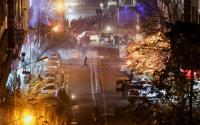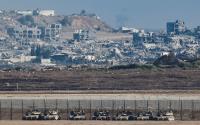16 May 2010Znet
Fear is the most pervasive public emotion in most of the world today. This fear is not irrational, but it doesn't necessarily lead to wise ways of handling the presumed dangers. The way it operates can be clearly perceived in two notable events of the recent past. The first was the dramatic plunge of stock market values on the New York Stock Exchange on May 6 - a plunge that astonished everyone and lasted a mere few minutes. The second was the riots in Athens that have already led to three deaths and which are still continuing. What happened on the Stock Exchange? It seems that on that morning the Dow Jones industrial average had gone down some 300 points. This was a considerable downturn (about 3%), but one that seemed a not unusual reaction to a combination of bad news on various fronts in the United States plus the growing uncertainties about Greece's likelihood of avoiding bankruptcy. But then, in late afternoon, the Dow went down another 700 points with incredible rapidity. It was the largest intraday decline on record. It was totally unanticipated and apparently left the traders "dumbstruck." Some major stocks fell 90% to being worth a penny. Then, as traders "watched open-mouthed" and almost as quickly as the plunge happened, the Dow went up again, ending at a loss of "only" 371.80 points - to the market traders' seeming relief. Of course, everyone sought an explanation. The first one offered was that a single trader had a "fat finger" and may have entered a trade in billions when he meant millions. The problem with this explanation is that no one has been able to locate this person or demonstrate that he exists or did indeed have a "fat finger." Then, an alternative explanation began to circulate. The N.Y. Stock Exchange has a slowdown mechanism when trading seems to be too rapid. But other exchanges do not have the same mechanism. So, some suggest, traders faced with the slowdown on the N.Y. Stock Exchange decided to shift trading to other exchanges. Some suggest a further twist on this explanation: it was the fault of so-called algorithmic trading strategies, which involve automatic trading mechanisms pre-programmed to make such a shift. The lack of coordination between the various exchanges, it is said, is a fault with the regulations, and now some argue that all exchanges should have joint slowdown mechanisms. For others, the plunge might have been caused by an automatic mechanism, so one can blame machines and not persons. All these explanations may or may not be valid. But they omit the fact that at various points, human decisions intervened - to react to the beginning of the plunge, to slow down the trading, to begin to buy again and allow the Dow to rise. And here is where the fear factor enters in. A stock exchange involves by definition risk and uncertainty. But traders depend fundamentally on the sense that the fluctuations are relatively minor, that they occur within a certain expectable range. When the fluctuations begin to be wild, which means extensive and sudden, traders understandably panic. And when they panic, they inevitably accentuate further the fluctuations. It is a vicious circle. At the very moment that the traders in New York panicked, they could view on their screens the riots in Athens. This upset them even further, for two reasons. They were deeply uncertain how the European Union countries would finally decide to aid Greece (or even if they would). They were deeply uncertain what the implications for U.S., west European, and Japanese banks of European action (or inaction) about Greece's problems were. And they were deeply uncertain about whether Greece's potential bankruptcy would entail a global unraveling of the world market. But most of all, they were right to be fearful of the riots. The riots were the result of Greek fears. What concerned most Greeks was the distinct likelihood that their real income would be radically reduced in the coming years. They were angry about this and very afraid. And they were not at all convinced that this was somehow their fault, a fault for which they should pay. But the fears of Greek citizens are clearly only the tip of a world iceberg, as government leaders around the world, and stock market traders, are well aware. The Greek government's problem is quite simple. Its tax revenue is too small and its expenditure level too high for its current and prospective future income. So it must either raise taxes (if it could collect them) or cut expenditures or both - and drastically. This is however also the problem of Germany, France, Great Britain, the United States, and the list goes on. Nor are the few countries that seem to have their fiscal heads above water at the moment (such as Brazil or China) exempt from this contagion. The Greeks are taking to the streets to protest. But this will spread. And, as it spreads, the world market will become ever more volatile, and the fears will expand, not contract. The major policy response everywhere has been to buy time with paper money that is borrowed or printed. The hope is that, somehow, during the borrowed time, renewed economic growth will occur and restore confidence, ending the real and latent panics. Politicians grasp every little sign of such growth and overinterpret it. A good example is applauding recent job creation in the United States, when that job creation was less than the size of the population growth in the same period. The fear is not irrational. It is the consequence of the structural crisis of the world-system. It cannot be solved by the band-aids that governments are using to treat the serious ailments we confront today. When fluctuations get too great and too rapid, no one can rationally plan. So people no longer act as reasonably rational actors in a relatively normal world-economy. And it is this degree of heightened fear that is the fundamental reality of the present era.






